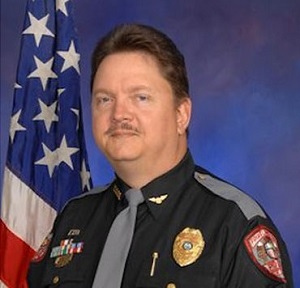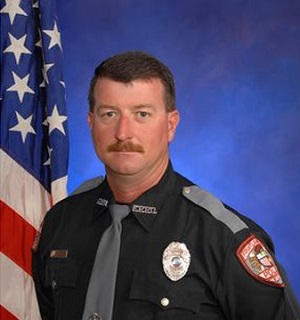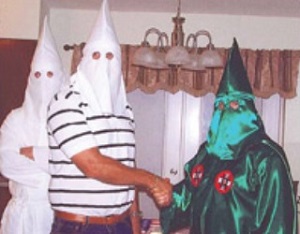Florida Police Department Rocked, Yet Again, by Officers' Alleged Klan Membership
In the winter of 2009, a young patrolman named James W. Elkins was forced to resign from the 12-officer Fruitland Park, Florida police department when it was discovered he was a recruiter for and high-ranking member of the Ku Klux Klan.
After Elkins turned in his badge, the police chief at the time, J.M. Isom, declared, “I can guarantee you that none of my police officers who work here are members of the KKK.”
“That was completely wrong,” Elkins told Hatewatch today. “They knew I wasn’t the only one then. They just swept it under the rug. I hope they don’t get away with doing it again.”
Over the weekend, the Fruitland Park police department’s deputy chief, David Borst, 49, resigned and another longtime department veteran, Cpl. George Hunnewell, was fired because of their alleged membership in the same group Elkins belonged, the United Northern and Southern Knights of the Ku Klux Klan.
The current police chief, Terry Isaacs, told Hatewatch today that both officers “emphatically deny” being in the Klan, adding that he was tipped off to their possible membership by the Florida Department of Law Enforcement and the FBI.
Isaacs said the FBI discovered the officers’ alleged Klan involvement in the course of an investigation that he believes stretches across the country and even overseas. He said he did not know the nature of the investigation but was assured that his department was not a target.
He said prosecutors are reviewing the cases that the two officers have pending, and “if these cases don’t stand on their own, my recommendation is that they drop them.” An as-yet-unknown number of cases could be in jeopardy.
Elkins, 33, estimated that at least four members of the department belonged to the Klan when five years ago he was patrolling the streets of Fruitland Park. The city, 48 miles from Orlando in central Florida, is popular with retirees and has a population of 4,000. He added that “probably 10 out of the 12 fulltime officers” were sympathetic to the Klan.
“I didn’t know how sympathetic that agency was until I started working there,” he said.
Chief Isaacs has been on the job for a little more than three years. He told Hatewatch that he has no idea whether Elkins is correct about how many officers belonged to the Klan or were sympathetic before he arrived.
“I hope to God and pray that is not true,” he said.
Isaacs said that when he took the job there were 13 full-time officers. Nine of those officers and the secretary are gone. “I either ran them off for disciplinary actions or they quit because they didn’t agree with the direction I wanted to go,” he said.
“Since I’ve come here, I’ve been very, very hardcore and very strict on bringing this from the old culture into a new professional culture,” Isaacs said. “I’ve set strict guidelines as far as our ethics go, diversity training. I don’t allow any joking, any comments. I’m very strict on that. I was somewhat shocked. I did not expect that in 2014.”
The chief quickly added that until this weekend, none of the officers was fired or resigned because of any possible Klan connection. “We have not had a racial complaint since I’ve been here,” he said.
Mark Pitcavage, director of investigative research at the Anti-Defamation League (ADL), said that on average there is one incident a year of a law enforcement officer being exposed as a member of an extremist group, including white supremacist groups and the sovereign citizen movement. “Which means there are others who never get caught or exposed,” Pitcavage said. “It’s a troubling thing whenever anybody like this is caught or exposed because these are people who are supposed to protect everybody’s rights.”
But the good thing is, Pitcavage added, “it doesn’t happen very much.”
“It’s certainly not like the South in the 1950s or 60s,” he said, “where you could have sort of widespread associations between law enforcement organizations and groups like the Ku Klux Klan. That’s not the situation we have now.”
Elkins told Hatewatch he has been an active participant in the white nationalist movement for his entire adult life, including the time he joined the Fruitland Park police department in the summer of 2004 after three years as a prison correctional officer.
“The entire purpose of that movement,” he said, “is to put people within government. I was clean cut. I knew the law, so that’s what I did. The whole purpose of putting people in places in the government is to assist in making a change. You’re never going to get someone elected under the ticket of the Knights Party or the American Nazi Party.”
Elkins insisted, however, that he never used his gun or his badge to “subvert the government” or “for racial profiling or anything of that nature.”
He said he was a member of the National Aryan Knights, which then merged with the United Northern and Southern Knights of the Ku Klux Klan. Before long, he was promoted to Grand Dragon and opened a PO Box as the group tried to recruit new members. “The only problem,” Elkins said, “is a PO Box is traceable. That’s how I got found out.”
When authorities traced a recruitment flyer that Elkins and another Klansman had distributed to Elkins’ PO Box, police officials began pressuring him to resign, which he did in January of 2009. He felt betrayed by the department and his fellow Klansmen who did not come to his defense.
“My quote-unquote politically incorrect beliefs were no secret,” he said. “I wasn’t a dirty cop, but I guess by today’s standards I wasn’t morally ethical just based on my beliefs.”
Elkins said he gave up his police certification and cannot get a job in law enforcement. Borst and Hunnewell reportedly retained their certification, and it is possible but unlikely that they could continue their police careers elsewhere.
“I have no sympathy what-so-ever for what they’re going through, because now they know what I went through,” Elkins said. “After all that stuff came out I hit a real low point in my life.”
He spent three months in New Zealand “to rethink his life and priorities.” When he returned no one would hire him. He was out of work for three years. “You can’t hide from Google,” he said.
His marriage broke up, but he finally found a job working in the kitchen of a local business. He got remarried and eventually decided to “be a stay-at-home dad” to care for his 5-year-old son.
Through it all, he said, he is still in the movement, although no longer a Klansman.
“I’m still very much a National Socialist,” he said. “But it’s not the 1930’s anymore. It’s not the 1950s. It’s not the 1960s. It’s a different age. It’s a different America. Therefore it requires a different form of action.”



